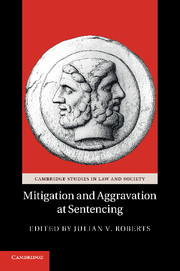Book contents
- Frontmatter
- Contents
- Tables
- Contributors
- Foreword
- Acknowledgments
- Chapter one Punishing, more or less
- Chapter two Re-Evaluating the Justifications for Aggravation and Mitigation at Sentencing
- Chapter three The Search for Principles of Mitigation
- Chapter Four Personal Mitigation and Assumptions about Offending and Desistance
- Chapter Five Intoxication as a sentencing factor
- Chapter Six Beyond the Partial Excuse
- Chapter Seven Equality before the law
- Chapter Eight Personal mitigation
- Chapter Nine Exploring Public Attitudes to Sentencing Factors in England and Wales
- Chapter Ten The Pernicious Impact of Perceived Public Opinion on Sentencing
- Chapter Eleven Addressing Problematic Sentencing Factors in the Development of Guidelines
- Chapter Twelve Proof of Aggravating and Mitigating Facts at Sentencing
- Chapter Thirteen Mitigation in Federal Sentencing in the United States
- Chapter Fourteen The discretionary effect of mitigating and aggravating factors
- Index
- References
Chapter Five - Intoxication as a sentencing factor
Mitigation or Aggravation?
Published online by Cambridge University Press: 07 September 2011
- Frontmatter
- Contents
- Tables
- Contributors
- Foreword
- Acknowledgments
- Chapter one Punishing, more or less
- Chapter two Re-Evaluating the Justifications for Aggravation and Mitigation at Sentencing
- Chapter three The Search for Principles of Mitigation
- Chapter Four Personal Mitigation and Assumptions about Offending and Desistance
- Chapter Five Intoxication as a sentencing factor
- Chapter Six Beyond the Partial Excuse
- Chapter Seven Equality before the law
- Chapter Eight Personal mitigation
- Chapter Nine Exploring Public Attitudes to Sentencing Factors in England and Wales
- Chapter Ten The Pernicious Impact of Perceived Public Opinion on Sentencing
- Chapter Eleven Addressing Problematic Sentencing Factors in the Development of Guidelines
- Chapter Twelve Proof of Aggravating and Mitigating Facts at Sentencing
- Chapter Thirteen Mitigation in Federal Sentencing in the United States
- Chapter Fourteen The discretionary effect of mitigating and aggravating factors
- Index
- References
Summary
The criminogenic effect of alcohol is well known; in a significant proportion of offences, particularly those involving violence, the accused was intoxicated at the time of the offence. Should the fact that he or she was drunk be taken into account and, if so, how? There are three possible positions: intoxication could either mitigate or aggravate the ‘deserved’ penalty, or the offender’s lack of sobriety might be immaterial to sentencing.
CHAPTER OVERVIEW
This chapter explores this common circumstance which has such important consequences for sentencing across offences and jurisdictions. In the conclusion of his book Alcohol and Crime (2006), Dingwall writes:
Given the large number of defendants who raise intoxication as a mitigating factor at the sentencing stage, the paucity both of a guiding approach and of academic attention to the issue is alarming. (p. 170)
- Type
- Chapter
- Information
- Mitigation and Aggravation at Sentencing , pp. 81 - 101Publisher: Cambridge University PressPrint publication year: 2011
References
- 28
- Cited by



